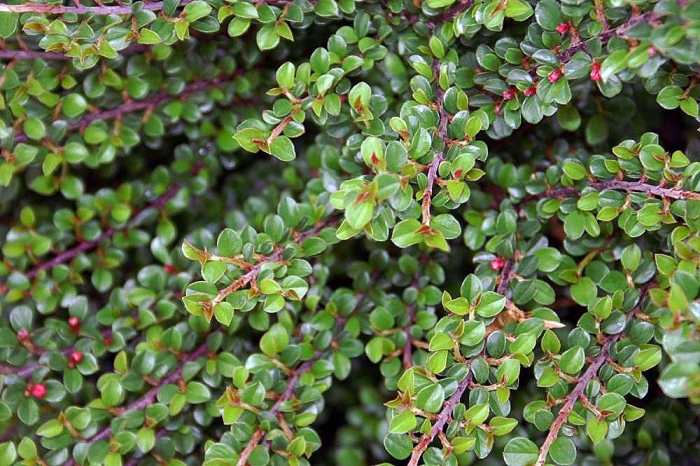Creeping Cotoneaster
(Cotoneaster adpressus)
Creeping Cotoneaster (Cotoneaster adpressus)
/
/

Photo by David J. Stang
CC BY-SA 4.0
Image By:
Photo by David J. Stang
Recorded By:
Copyright:
CC BY-SA 4.0
Copyright Notice:
Photo by: Photo by David J. Stang | License Type: CC BY-SA 4.0 | License URL: https://creativecommons.org/licenses/by-sa/4.0 | Uploader: David Stang | Publisher: Wikimedia Commons | Title: Cotoneaster_adpressus_Little_Gem_0zz.jpg | Notes: |













Estimated Native Range
Summary
Cotoneaster adpressus, commonly known as Creeping Cotoneaster, is a deciduous shrub native to the Himalayas to western China. It typically forms a low, dense mat up to 2 meters (6 ft 7 in) wide, with a height of only 10-30 cm (4-12 in). The plant features small, rounded, dark green leaves and produces a profusion of small, white flowers in late spring to early summer, followed by showy, bright scarlet berries that persist into winter, providing visual interest and food for birds.
Creeping Cotoneaster is valued for its use as an attractive ground cover, especially in rock gardens and on slopes for erosion control due to its mat-forming habit. It is also suitable for border fronts and cascading over walls. This plant is low-maintenance, tolerates a range of soil types, and is drought-resistant once established. It prefers full sun to part shade and requires well-drained soils. While it has received the Royal Horticultural Society’s Award of Garden Merit, gardeners should be cautious as it can become invasive in some regions, outcompeting native vegetation.CC BY-SA 4.0
Creeping Cotoneaster is valued for its use as an attractive ground cover, especially in rock gardens and on slopes for erosion control due to its mat-forming habit. It is also suitable for border fronts and cascading over walls. This plant is low-maintenance, tolerates a range of soil types, and is drought-resistant once established. It prefers full sun to part shade and requires well-drained soils. While it has received the Royal Horticultural Society’s Award of Garden Merit, gardeners should be cautious as it can become invasive in some regions, outcompeting native vegetation.CC BY-SA 4.0
Plant Description
- Plant Type: Shrub
- Height: 0.5-1 feet
- Width: 4-6 feet
- Growth Rate: Slow
- Flower Color: N/A
- Flowering Season: Spring
- Leaf Retention: Deciduous
Growth Requirements
- Sun: Full Sun, Part Shade
- Water: Medium
- Drainage: Medium, Fast
Common Uses
Bank Stabilization, Bee Garden, Bird Garden, Border Plant, Butterfly Garden, Deer Resistant, Drought Tolerant, Erosion Control, Groundcover, Hedges, Hummingbird Garden, Low Maintenance, Potted Plant, Rabbit Resistant, Rock Garden, Street Planting
Natural Habitat
Native to Western China and typically forms a low, dense mat as a deciduous shrub
Other Names
Common Names: Mattoxbär, Sparrige Zwergmispel, Squarrose Cotoneaster
Scientific Names: , Cotoneaster adpressus, Cotoneaster adpressus var. praecox, Cotoneaster praecox, Cotoneaster disticha var. duthieana, Cotoneaster horizontalis var. adpressa, Cotoneaster nanchuanicus, Pyrus adpressa,
GBIF Accepted Name: Cotoneaster adpressus Bois